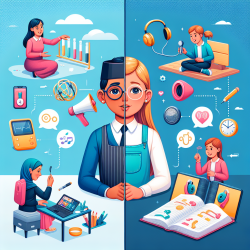The Future of Special Education: Embracing Virtual Therapy
In an ever-evolving educational landscape, special education funding agencies are faced with the challenge of providing effective support to students with diverse needs. One revolutionary solution that has emerged is virtual therapy, a dynamic approach that leverages technology to deliver speech therapy in schools. As an advocate for data-driven decisions, I invite you to explore how online speech therapy can enhance educational outcomes and why it's time to consider this innovative approach.
Data Speaks: The Efficacy of Online Speech Therapy
Research consistently supports the efficacy of online speech therapy. A comprehensive study conducted by Kent State University found that virtual therapy sessions are as effective as traditional face-to-face interactions. The study highlighted significant improvements in communication skills among students receiving online therapy, with no notable difference in progress compared to those in conventional settings.
Furthermore, the flexibility of virtual therapy allows for more frequent sessions, enabling consistent practice and reinforcement of skills. This increased exposure to therapy can accelerate progress, leading to better outcomes for students. Data-driven insights like these underscore the potential of online speech therapy to revolutionize special education.
Benefits of Virtual Therapy for Schools and Students
Virtual therapy offers numerous advantages that make it an attractive option for schools and funding agencies:
- Accessibility: Online therapy breaks down geographical barriers, ensuring that students in remote or underserved areas have access to quality services.
- Cost-Effectiveness: By reducing travel expenses and optimizing therapist time, virtual therapy can be a more economical solution for schools.
- Customization: Digital platforms allow for personalized therapy plans tailored to the unique needs of each student, enhancing the effectiveness of interventions.
- Data Tracking: Online platforms facilitate real-time tracking of student progress, enabling data-driven decisions and adjustments to therapy plans.
Empowering Educators and Families
Virtual therapy not only benefits students but also empowers educators and families. Teachers can easily collaborate with therapists to integrate therapy goals into classroom activities, fostering a holistic approach to learning. Additionally, parents gain access to resources and support, enabling them to reinforce skills at home.
The integration of online speech therapy into school systems creates a collaborative ecosystem where educators, therapists, and families work together to support student growth. This synergy enhances the overall educational experience, ensuring that students receive the comprehensive support they need to thrive.
Taking the Next Step: Implementing Virtual Therapy
As special education funding agencies, your role is pivotal in shaping the future of education. By embracing virtual therapy, you can ensure that students receive the highest quality of care, regardless of their location. The data-driven evidence supporting online speech therapy is compelling, and the benefits are clear.
Now is the time to take action. Consider partnering with a reputable provider like TinyEYE to implement virtual therapy in your schools. By doing so, you can make a significant impact on the lives of students, empowering them to reach their full potential.
In conclusion, virtual therapy represents a transformative approach to special education. With its proven efficacy, accessibility, and cost-effectiveness, it offers a powerful solution for funding agencies committed to improving student outcomes. Let's work together to create a brighter future for all students.










